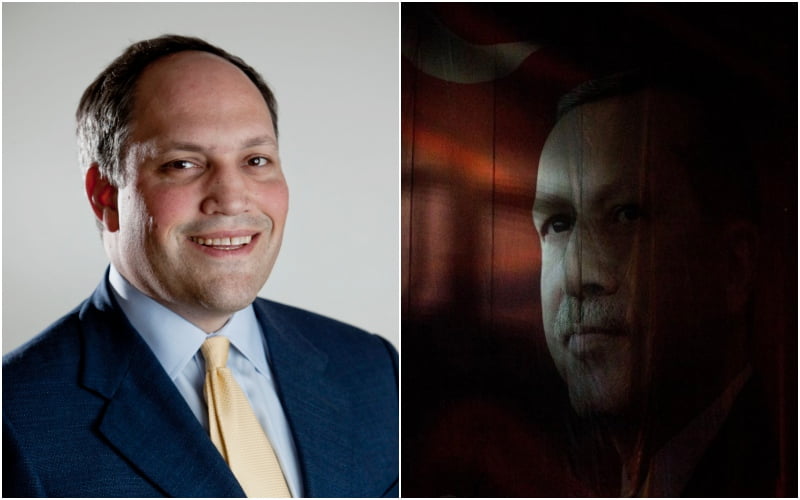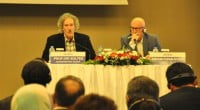Did Erdogan stage the coup?

Date posted: April 14, 2017
Michael Rubin
It’s been almost nine months since Turkish President Recep Tayyip Erdogan crushed a coup attempt and then declared a state of emergency, imprisoning opposition politicians, arresting tens of thousands of perceived opponents, journalists, and civil society leaders, confiscating opponents’ businesses and bank accounts, and cracking down on the remnants of the free press. Erdogan called the coup attempt and the excuse to crush his opponents “a gift from God.”
But was the coup really “a gift from God” or was it Erdogan’s gift to himself? Was it Turkey’s equivalent of the Reichstag Fire?
Even before the smoke cleared, Erdogan blamed exiled cleric (and one-time ally) Fethullah Gulen for masterminding the coup attempt. Turkish officials demand his extradition, yet neither the State Department nor the Justice Department have found the evidence presented by their Turkish counterparts to be credible, coherent, or comprehensive. The United States is not alone in this: German intelligence and the British government have likewise cast doubt on the official Turkish narrative.
Consider the problems or unanswered questions in Erdogan’s narrative:
- Were the coup plotters Gulenists? While it seems certain that members of Gulen’s Hizmet movement played a role, many of the participating soldiers who were involved in the movement seemed either to have no advance knowledge of the impending coup or simply gambled on the losing side as events were underway. Many of those participating in the coup—followers of Gulen and others—received orders and believed they were on an exercise. This is especially true of students in the military academies. Harvard University scholar Dani Rodrik has made a convincing case that Gulenists were behind the coup, but cui bono logic does not substitute for proof nor does it necessarily mean that the Gulenists could be the only party to benefit. Erdogan has long targeted secularists and career officers. As he has moved to promote his own family—son Bilal and son-in-law Berat Albayrak—he has also antagonized long-time supporters within his own Justice and Development Party (AKP). Indeed, the brother of the former vice president of Erdogan’s ruling party was among the participants. There have also been numerous questions raised over the role and/or competence of Hakan Fidan, Turkey’s intelligence chief. Erdogan reportedly learned of the coup plot rather than Fidan, whom Erdogan could not reach for hours as the coup unfolded.
- Could Gulenists really have infiltrated the military? The Turkish military has long been suspicious of Gulen and his followers. Could Gulen’s followers within the military really pulled it off, if they had been inclined to do so? Here, it’s important to remember the culture of Turkey’s professional military: Many officers began as student cadets in their early teens and essentially grew up together, lived together, and know pretty much everything there is to know about their colleagues. It is extremely hard to hide something like religion or sympathy to Gulen. The Turkish military will also survey peer groups before major promotions and those who may have fallen under Gulen’s sway usually do not reach flag rank.
- Did Erdogan’s government collate the purge lists prior to any plot? The list of alleged coup plotters was so extensive that it was impossible to put it together in the hours after the coup. The fact that it included individuals who died in the weeks and months before their listing shows the spuriousness of the list and the lack of any honesty investigation. Badirma Prosecutor Ahmet Bicer, for example, died in May 2016 but was included on the purge list published on August 31, 2016. Then there was the case of Navy non-commissioned officer Esat Kalkan killed August 14, 2016 in Afghanistan, but nevertheless purged on November 22, 2016. The same purge list announced Mehmet Kargi’s firing from the Nusaybin municipality, even though he had died a month before. If investigators could not tell if a suspect was alive or dead, it says a lot about the quality of the investigation.
- Did Special Forces really try to kidnap Erdogan? According to testimony, a Special Forces team flew by helicopter to Marmaris, where Erdogan was on vacation, at 2 am and arrived at the president’s hotel at 3 am. When the Special Forces team approached the hotel, a police detail opened fire on them. There are two problems with this narrative, however. First, the government cannot explain why no one prevented the helicopter from departing more than five hours after imposition of an air ban and, second, why Erdogan’s police detail remained at the hotel hours after the man they were protecting had departed. Another question involves the death of police officer Ndeip Cengiz Eker. The initial autopsy showed not only was he slashed to death using a weapon Special Forces teams do not carry, but he also died several hours before the Special Forces team arrived. In short, it appears that one specific Special Forces team was ordered into action from above in order to give the appearance of a coup, but Erdogan was never in any danger. Indeed, the testimony of the owner of the hotel where Erdogan was staying seemed to back this up.
- What was SADAT doing? Erdogan and his followers argue that Gulenists shot down more than 200 citizens in cold blood. The problem here is that eyewitnesses say that members of SADAT, an Islamist private security company led by Erdogan-ally Gen. Adnan Tanriverdi, was apparently firing on civilians. Erdogan has, in effect, cultivated SADAT as a paramilitary force to do his dirty work. Many civilians on the Istanbul Bridge also reportedly died after being shot by snipers. The regular military unit on the bridge did not include snipers. In addition, if true, snipers would have had to be prepositioned ahead of time. At the very least, it is long past time Erdogan and the government detailed the movements, apparent prepositioning at key points, and involvement of this pro-AKP paramilitary group on the day of the coup.
- Who was behind the explosion in parliament? Erdogan blamed rebel air force pilots for bombing the parliament. I talked to a couple pilots, however, and they pointed out that on the night of the coup, jets flew low, essentially buzzing the building. When fighter-bombers fly low, the purpose is usually psychological since to bomb with accuracy, it is necessary to fly higher. They also question how aerial bombardment would damage the wall of the parliament rather than the roof. Likewise, given the huge size of the Turkish Presidential Palace, they suggest no trained pilots could miss unless there intention was more a show than real. The same holds true for the failure of coup participant pilots to shoot down the ‘escaping’ Erdogan’s airplane. Indeed, it appears many of those flying were acting more as escort than aggressor.
- Why did recalled officers have to be vouched for by Islamist clerics? In the aftermath of the coup attempt, Erdogan ordered many diplomats and military officers stationed abroad as attaches in Embassies or staff officers in NATO missions to return to Ankara. Almost all were summarily arrested at the airport but were told if they could have religious clerics from Milli Gorus or similar groups vouch for them, then they could avoid prison. In effect, this suggested Erdogan’s intention was not only to imprison Gulenists but also to purge any officer who was secular and avoided his own brand of political Islam.
Erdogan may complain that neither American officials nor their European counterparts believe him and accept Turkish evidence about the evening of the coup. If Erdogan would allow Turkey’s judiciary to explore such questions or if Erdogan himself would testify as to the inconsistencies within his own story, he might find people would take the ultimate findings more seriously. Erdogan might suppress free inquiry in the Turkish press but, fortunately, the rest of the world does not need to adhere to Erdogan’s parameters of permissible speech.
Source: American Enterprise Institute , April 14, 2017
Tags: Erdogan’s Reichstag Fire | Military coups in Turkey | Turkey |
























